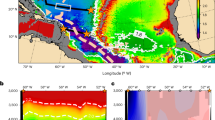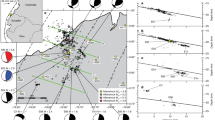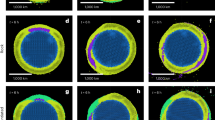Abstract
The West Antarctic ice sheet is believed to be inherently unstable because much of it is grounded below sea level1–4. It has been suggested that the ice sheet has withdrawn from its late Wisconsin maximum position, grounded at the edge of the continental shelf, and is now undergoing collapse as a delayed response to the warming and sea-level rise of the Holocene5, and that the ice sheet is likely to collapse shortly in response to rising CO2 levels in the atmosphere6. We present here some geomorphological evidence from Alexander Island and the Antarctic Peninsula which does not agree with either hypothesis. Rather, following deglaciation from the Wisconsin maximum, there was less ice than at present around 8,000 yr ago. The ice shelf in George VI Sound has built up subsequently.
This is a preview of subscription content, access via your institution
Access options
Subscribe to this journal
Receive 51 print issues and online access
$199.00 per year
only $3.90 per issue
Buy this article
- Purchase on Springer Link
- Instant access to full article PDF
Prices may be subject to local taxes which are calculated during checkout
Similar content being viewed by others
References
Hughes, T. J. geophys. Res. 78, 7884–7910 (1973).
Weertman, J. Nature 260, 284–286 (1976).
Hughes, T. Rev. Geophys. Space Phys. 15, 1–46 (1977).
Thomas, R. H., Saunderson, T. J. O. & Rose, K. E. Nature 277, 355–358 (1979).
Hughes, T. Rev. Geophys. Space Phys. 13, 502–526 (1975).
Mercer, J. H. Nature 271, 321–325 (1978).
Horne, R. R. Br. Antarct. Surv. Bull. 22, 61–76 (1969).
Bell, C. M. Br. Antarct. Surv. Bull. 33 & 34, 1–16 (1973).
Bell, C. M. Br. Antarct. Surv. Bull. 39, 35–44 (1974).
Adie, R. J. Antarctic Research (eds Priestley, R., Adie, R. J. & Robin, G. de Q.) 118–162 (Butterworths, London, 1964).
Mercer, J. H. Int. Ass. Sci. Hydr. 79, 217–225 (1968).
Denton, G. H. & Hughes, T. J. (eds) The Last Great Ice Sheets (Wiley-Interscience, in the press).
Lipps, J. H., Ronan, T. E. & DeLaca, T. E. Science 203, 447–449 (1979).
Sugden, D. E. & John, B. S. Palaeoecology of Africa and of the Surrounding Islands and Antarctica, Vol. 8 (ed. van Zinderen Bakker, E. M.) 139–159 (Balkema, Cape Town, 1973).
Harkness, D. D. Br. Antarct. Surv. Bull. 47, 43–59 (1979).
Hays, J. D., Imbrie, J. & Shackleton, N. J. Science 194, 1121–1132 (1976).
Lorius, C., Merlivat, L., Jouzel, J. & Pourchet, M. Nature 280, 644–648 (1979).
Author information
Authors and Affiliations
Rights and permissions
About this article
Cite this article
Sugden, D., Clapperton, C. West Antarctic ice sheet fluctuations in the Antarctic Peninsula area. Nature 286, 378–381 (1980). https://doi.org/10.1038/286378a0
Received:
Accepted:
Issue Date:
DOI: https://doi.org/10.1038/286378a0
This article is cited by
-
Evidence for an early Holocene climatic optimum in the Antarctic deep ice-core record
Climate Dynamics (1992)
-
A model of the Antarctic Ice Sheet
Nature (1982)
-
Evidence for a late Wisconsin glaciation of the Weddell Sea
Nature (1981)
Comments
By submitting a comment you agree to abide by our Terms and Community Guidelines. If you find something abusive or that does not comply with our terms or guidelines please flag it as inappropriate.



